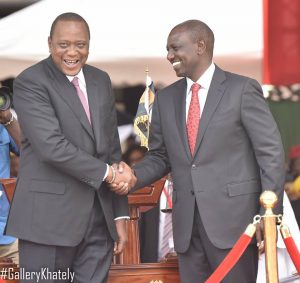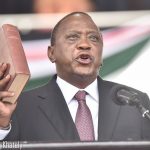The New Yorker – Kenya’s Most Famous Critic of Politicians Runs for Political Office
Kenya’s Most Famous Critic of Politicians Runs for Political Office
By Tristan McConnell
On a March afternoon, as gray clouds gathered overhead, Boniface Mwangi procrastinated outside the walled Kariokor Market, in Nairobi, scrolling through text messages on his iPhone. Mwangi is thirty-four years old and a well-known political activist whose tactics frequently put him at the center of attention. On that day, however, he was entering the narrow, crowded alleys of the market not to protest government corruption—his signature issue—but to campaign for a seat in parliament, and he was nervous.
“When you protest, you want the government to do something, but now they expect me to do something for them,” Mwangi said, of the potential voters inside the market. “It’s no longer the government to blame but you who will be responsible for the mess. It’s a very different feeling.”
Mwangi finally silenced his phone and tucked it into the pocket of his jeans. Then, clutching a sheaf of yellow flyers with his picture on them, he plunged through a rusty metal doorway and into the market.
Mwangi started out as a photojournalist for a Kenyan newspaper, where he earned a reputation for fearlessness and simple, unpretentious frames. His career was changed, as so much in Kenya was, by the 2007 national election, in which the incumbent, Mwai Kibaki, a member of the Kikuyu tribe, was pitted against Raila Odinga, a Luo. On December 30th, Kibaki was declared the victor—it was a surprise, and Odinga rejected the result, claiming fraud. What followed was two months of violence that left almost fourteen hundred people dead, as politically motivated tribal violence tore through the Great Rift Valley and the capital.
During the violence, Mwangi took his camera into Nairobi’s slums, where the intercommunal fighting and the police crackdown were most brutal. Day after day, he captured images of the beatings, lynching, and murderous rage incited by politicians.
International pressure eventually forced the candidates into a power-sharing government, and the killings ceased. Mwangi’s editors ordered him to get back to work taking regular news photographs of the very leaders whom Mwangi blamed for the maiming and killings. It was as if they bore no responsibility. In June, 2009, during Madaraka Day, a celebration of the anniversary of Kenya’s self-rule, he heckled President Kibaki from the stadium stand; he was swiftly and roughly arrested. In that moment, Mwangi switched from observer to activist.
Independently at first, and then with the support of politically engaged artists, musicians, and activists, Mwangi built his second career as a protester and organizer. He used social media to rally supporters and publicize protests. In 2011, he founded Pawa 254, an artists’ and activists’ collective and workspace where he would conceive and plan his protests.
Broad-shouldered and restless, Mwangi speaks quickly and has a deep, explosive laugh and a flair for witty stunts. He once filled the streets of Nairobi with giant polystyrene babies, to ridicule Kenya’s political immaturity, and another time with donkeys, to symbolize the Kenyan people’s exhaustion with the corruption in their country. While the focus of his activism is corruption and greed, he also once worked to prevent a primary-school playground from being turned into a parking lot for a hotel owned by a politician, and once joined a march supporting a woman’s right to wear whatever she chooses, wearing a dress himself. His confrontational approach has earned him death threats but it has also brought him fans, often young, social-media-using urbanites. “The things I said outside parliament,” Mwangi told me. “I want to say them inside.”
Mwangi grew up in Starehe, a constituency in central Nairobi that encompasses both the downtown business district and slums. That day in March, as he entered the Kariokor market, just north of the city center, he shook hands with three men who were watching as a fourth plucked a chicken over a plastic basin, and gave them flyers. He then approached a market stall and workshop where leather shoes were sold, plastic-wrapped, for fifteen dollars a pair.
“Eh, Mwangi! Selfie?” one of the shoemakers shouted, brandishing a smartphone. His name was Austin Wandera and he wore greasy jeans patched with squares of rubber from an inner tube. “I need selfie with mheshimiwa,” he said, using the Swahili honorific for parliamentarians.
Mwangi gamely posed, bumped fists with Wandera, and moved on. Mwangi’s assistant, Patrick Karanja, stuck around and collected Wandera’s name and phone number, which was added to the thousands of others on the ever-growing WhatsApp and SMS distribution lists that Mwangi uses to rally support. “Social media, for me, is like my radio station,” he said.
Social media enabled Mwangi’s protests, which he would brand and advertise on Facebook, Twitter, and WhatsApp—all of which are hugely popular in Kenya. His Facebook page has two hundred and fifty-four thousand likes; his Twitter feed has six hundred and sixty-four thousand followers. He solicits donations from supporters to fund his campaign. One day, he received both a ten-cent donation and a six-hundred-and-eighty dollar donation, sent via M-Pesa, Kenya’s mobile-money service. Social media is also practical. Mwangi says that he doesn’t have the money to plaster Starehe with posters or to pay people to come to a rally. Tweeting is cheap.
But hundreds of thousands of online supporters often translate into merely hundreds of street protesters, and he is certain to face the same challenge on Election Day, on August 8th. Kenya’s politics are often transactional, in a literal sense. Voters expect cash payments of a couple of dollars from campaigning politicians, knowing that it may well be the only thing they will ever get from their representatives; candidates hope the handouts will be an investment in their future ability to enrich themselves once in office. (Kenya’s M.P.s are among the best paid in the world, with some taking home around $12,700 a month, while the average urban Kenyan earns closer to ninety dollars monthly. Scandals involving the disappearance of government money are so common that no one pays much attention to them.) Kwamchetsi Makokha, a newspaper columnist, says that this tradition is not really vote buying, because handouts don’t guarantee votes, but is a symptom of Kenya’s cynical politics. “We are swimming in a cesspool of dishonesty: the electorate is dishonest, the candidates are dishonest, and we all figure out a way of getting round each other,” he said. In other words, candidates lie about what they will do for voters, and voters lie about whom they will vote for.
As the afternoon downpour began in earnest at the market, I talked to a woman named Jassy Muli, over the hammering of raindrops on tin rooves. Muli is twenty-eight years old, with thick braids and rectangular spectacles, and runs an M-Pesa kiosk in the market. She also sells fizzy drinks from a stall with a wire cage for a window. One night last year, a driver lost control of his car and smashed through the brick wall at the back of her stall. Muli was furious that the local M.P. at the time, a career politician in his mid-sixties, didn’t do anything. “The shop was down. No one help us. We struggled. No one come,” she said. The only time she recalled seeing her M.P. was just before the last elections, four years ago, when he came looking for votes. Politicians? “They do for themselves,” she told me.
At this inauspicious moment, Mwangi appeared. “I’m here to ask for your vote,” he said, leaning in solicitously. They spoke about her concerns, including the car-crash incident, and he promised a metal barrier on the roadside to protect her shop.
“Ever since the current M.P. was elected, he has done nothing,” Muli complained.
“Then elect me so I can go and be your voice,” Mwangi said. “I am Boniface,” he added, holding out a hand to say goodbye.
“Yes, I know you,” Muli replied, looking just a little star struck.
The odds are against Mwangi, as he challenges established political machines. Mwangi launched his political party, Ukweli (meaning “truth”), in mid-March, and he intends to run thirteen candidates for national and county assemblies. The party headquarters, in downtown Nairobi, still smelled of fresh paint when I visited. A transcript of Martin Luther King, Jr.,’s 1963 “I Have a Dream” speech hung by a window, and there was a framed photograph of Muhammad Ali, standing triumphant over Sonny Liston, above Mwangi’s desk.
Win or lose, Makokha, the columnist, told me, Mwangi’s candidacy is important. “He is brave in the sense that he tries things even if they are not going to work,” Makokha said. “What Boniface is trying to do is part of a continuing struggle for social change, and whether he succeeds this time or not I don’t think he is going to stop.”
Experience has taught Kenyans to see politics as a crooked business, and they are justifiably skeptical of politicians and those aspiring to become politicians. “When he’s inside parliament, he’s done,” Francis Ngugi, an Uber driver in his forties, told me. “As an activist, he’s a good guy. But as an M.P., he will be as greedy as the others. Just you wait. He should have stayed shouting from the outside.”
Mwangi has heard this before. “People who have integrity are afraid of going into politics. Most of my ardent supporters pray that I fail. They worry the system is so corrupt that I’ll be changed,” he said. “But I say, what if I succeed?”
This article first appeared on The New Yorker’s News Desk




